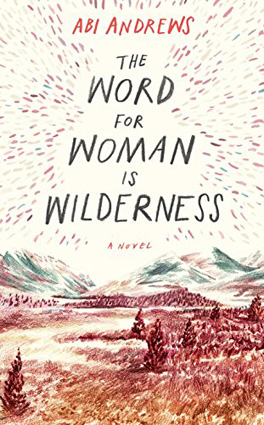Sometimes it can be so difficult to separate my emotional response to a book compared to my critical response. I don't think I necessarily have to which is one of the great things about a book blog! But reading Abi Andrews' debut novel “The Word for Woman is Wilderness” I was even more aware of this dilemma because it's inspired by and about subjects I'm really interested in and sympathetic towards. It's narrated from the perspective of nineteen year old Erin who has a passionate interest in the writing of Thoreau and the life of Christopher McCandless whose tragic journey led to his accidental death in the Alaskan wilderness. This was chronicled in Jon Krakauer's nonfiction book “Into the Wild” and a film with the same name directed by Sean Penn. Erin observes how the famous instances of individuals pioneering into the wilderness to establish a distance from the society whose values they question have all been directed through a men's perspectives. Certainly the experience and perspective of a woman who sets out on such a journey would be very different. So (against her parents' wishes) she ventures out from her home in England to the Alaskan wilderness and chronicles her journey on video with the plan to edit it into a documentary. She states: “if running into the wild is so often a wounded retreat from societal constraints and oppressions, then shouldn’t anyone but straight white men be doing it more?” Erin charts the mental and physical struggles she faces on her way while also contemplating both the dynamic distinctions and commonalities between the journey of mankind vs womankind.
The novel is evenly broken up into two sections: Erin's journey through the Arctic circle and hitchhiking across Canada to arrive in Alaska and her time inhabiting a remote cabin in the unpopulated wilderness. But throughout she makes references and draws in concepts from an enormous amount of sources: everything from quantum mechanics to Cartesian philosophy to the history of the Cold War space race to David Attenborough documentaries to the novels of Jack London. Such a dizzying array of topics is impressive and fascinating. It leads her to propose enticing new connections and pose deeply-thoughtful questions. But it has the effect of feeling like you've sat up all night with a fellow university student who is excitedly talking through everything they've been reading about. It can get a bit overwhelming at points and detract from the through line of the narrator's journey. Along the way Erin encounters several fascinating characters from an Icelandic woman she meets on a ship to a Native American who aides her after meeting a nasty trucker to a misogynistic interloper in Alaska. It felt like if Andrews had spent longer developing scenes with these characters and rounding out their personalities the novel would have felt more like a story than a collection of interesting concepts.
Frequent references are made to author and conservationist Rachel Carson
Erin's determined will to enter the wilderness leads the story. There are some beautifully poetic observations about our subjective experience of landscapes and the environment. When viewing the barren icy terrain of Greenland she states “It feels like trespassing to be alive in a place that is not dead but is inexistence, negation of potentiality. Anything alive is only ever passing through.” Then, at another point she remarks how “The tundra is always in soliloquy. Mostly it whistles and sings, but now and then the wind will die down suddenly and in the utter silence and still it feels like you are on stage. As though you did not know there were curtains until they just suddenly opened. Then the cacophony of noise again like applause.” There are also some great comic moments where she makes wry observations about the nature of travel like trying to understand the native language of a country you've entered through travel books: “I enjoy the narratives of phrase books. They always seem to follow a haphazard protagonist who is forever getting lost and bothering the emergency services.”
Of course, it's Erin's inner journey which is the real focus on this novel. She comments how “An esoteric landscape does not help a person to find their way if they are lost; you could walk from the centre of here and never find your way again.” It's necessary for her to physically travel in order to arrive at a new place of understanding and radically reform her sense of self. It's also necessary that it's a journey she makes alone: “It is not a casting out with purpose but a getting lost. It is the difference between solitude and loneliness.” It's touching how her time in Alaska leads her to reflect much more strongly about her own upbringing and the machinations of her psychology. She's aware of how much she's internalized stories of explorers as being strictly male enterprises because almost all the literature about it is written by men. She catches herself “Positioning myself as male again; my masculine counterpart who lives in my brain, appending a fraud penis so I can traverse Scott’s Antarctica in my imagination.” The fact of her journey makes a powerful statement that women also enter (both the spatial and inner) Wilderness. So, while I think it's sometimes too erratic, this novel was a great pleasure for me to read and it's also a flag that needed to be planted because Abi Andrews is marking new terrain.










